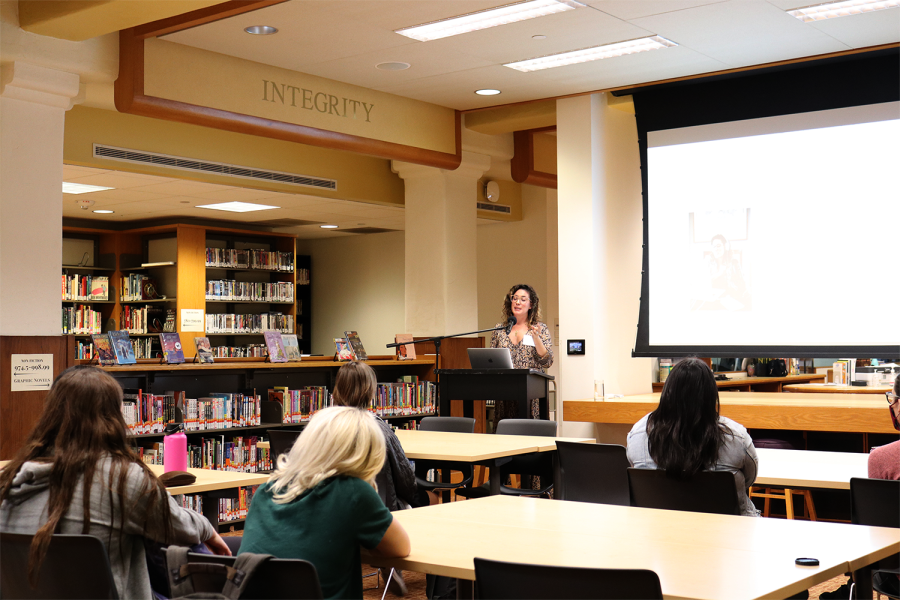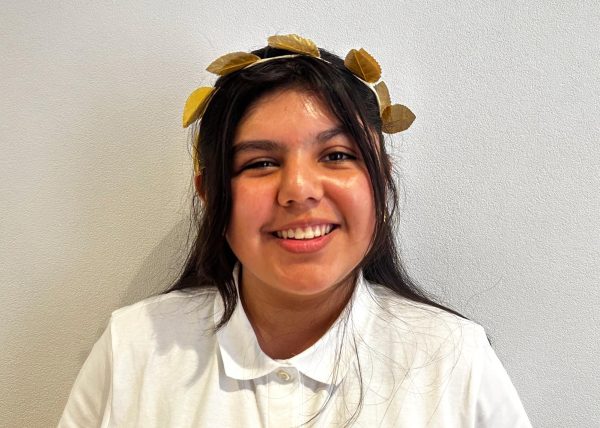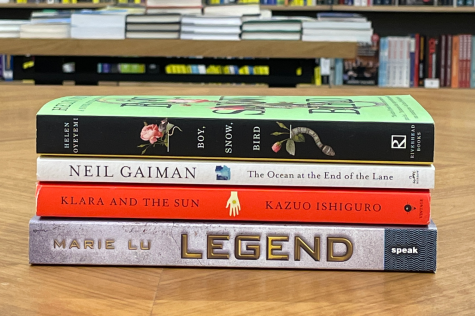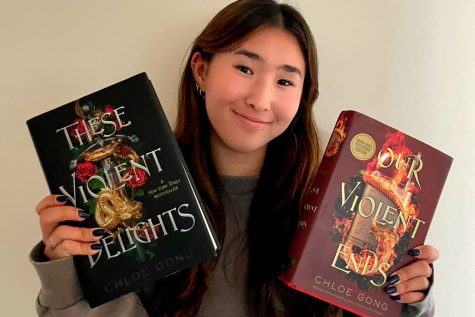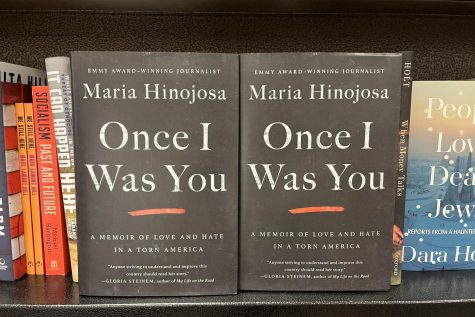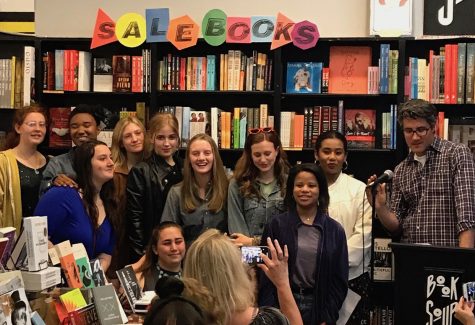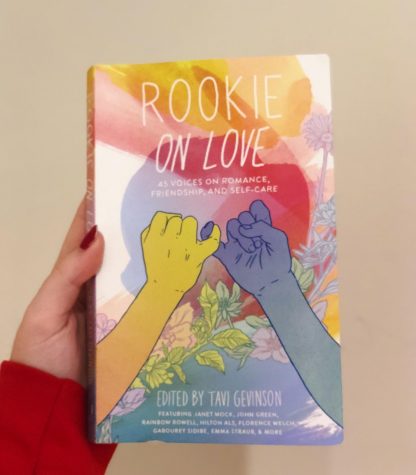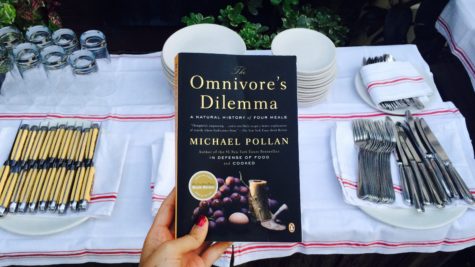Alumni Chelsea Austin’s book talk teaches attendees ‘self worth, self acceptance’
Photo credit: Maia Alvarez
Chelsea Austin explains the inspiration for her book at her book talk. Austin held a book talk for the Archer community April 1 to discuss her new memoir, “Inexplicably Me.” “I just want everybody to walk away feeling as loved as possible because a lot of people don’t feel that love, at home, at school, wherever it is,” Austin said. “So my hope is that I can exude this aura of love and that they can take away that they feel loved, even if it’s not conscious.”
May 1, 2022
Alumni Chelsea Austin Montgomery-Duban Wächter, whose pen name is Chelsea Austin, returned to campus Friday, April 1, as the first stop on her in-person book tour to discuss her new book “Inexplicably Me,” a “story of labels, worthiness and refusing to be boxed in.” Students of all grades gathered in the library to hear about Austin’s journey from her time at Archer to the author and public speaker she is today.
While working in real estate, Austin began to write the book in her spare time as a creative outlet to give back to herself. Austin said the book allows her to feel wholly herself by telling her story, as well as the story of her two gay fathers.
“Telling that story to me was really important because it’s mostly, for me, about developing my own self-worth and self-acceptance and hoping to be a bridge for others,” Austin said. “That’s why, in this moment in time, the book is really important, but it was initially just a way for me to feel like myself again.”
The memoir centers around the labels people use to solidify their identities and how, by redefining those labels, readers will learn how to redefine their own worth. As an attendee of the book talk, sixth grader Josephine Hatton said she learned the importance of being true to yourself.
“I feel like I will now try and label myself as who I truly am more than what I want other people to think of me,” Hatton said. “I would want myself to be popular just so that more people would like me. But now I would like my label to be [a] dog lover and dancer.”
Austin said returning to the campus reminded her of her time as an Archer student 11 years ago.
“It was important for me to come back, and a part of it feels like talking to my younger self and giving my younger self these life tips and tricks and ways of being that I didn’t have,” Austin said. “But a part of it is I just wanted to connect with Archer again. I think it’s as much for me to want to share my story here as it is for me to come back and feel my roots again.”
Austin said the book is timely because of the recent law implemented in Florida. Originally titled Parental Right in Education, which activist groups refer to as a “Don’t Say Gay” law, the law states public school teachers in kindergarten through third grade are banned from teaching lessons about sexual orientation. Grades fourth and above are prohibited to be taught lessons that aren’t age and developmentally appropriate.
Austin spoke about her experience with Proposition 8, a passed law that sought to ban same-sex marriage in California. Proposition 8 was later overturned in court.
“We’ve done this. We’ve worked for this. We got gay marriage or same-sex marriage legalized. It’s happening. And then now, 13 or 14 years later, it feels like ground zero,” Austin said. “What gives me hope is honestly watching your generation, watching young people how inspired they are, how willing they are to be themselves.”
My message is always that we define our worth, meaning we define our self worth. We get to decide that we’re valuable and worthy.
— Chelsea Austin ('11)
One of the book’s messages is how personal labels can be adjusted by surrounding yourself with people who care about you.
“If you surround yourself with … the people that are your cheerleaders and your hype people and the people that make you feel the most yourself all the time, the more you can find belonging and acceptance for yourself and others. I think that’s really the goal, and that’s how I worked it in my book. I always want to show people’s common humanity,” Austin said. “We all are more similar than we are different. Even the people that seem the most different from me, I can find common ground with them. What I try to illustrate in my book is a way for society to weave back there.”
Attendees of the book talk heard about how they can break out of societal boxes and embrace each aspect of themselves.
“I see the kids who are athletes who are also in drama. And I didn’t see that when I was growing up,” library assistant Denise Hernandez said. “I always felt like I had been confined to a label, and to know that somebody, who is in a similar age range as I am, comes back and says we felt this way and we don’t have to feel this way anymore, it’s something that I’ve embraced myself … So it really it’s great that you guys are hearing that right now.”
Austin said, within her book, she hopes to push others to come together and recognize their common humanity.
“I think sharing your story requires vulnerability,” Austin said. “The more we can be vulnerable with each other and share our stories and talk about things that we’re going through, the more we can see each other’s humanity and our own humanity and come together.”





![Freshman Milan Earl and sophomore Lucy Kaplan sit with their grandparents at Archer’s annual Grandparents and Special Friends Day Friday, March 15. The event took place over three 75-minute sessions. “[I hope my grandparents] gain an understanding about what I do, Kaplan said, because I know they ask a lot of questions and can sort of see what I do in school and what the experience is like to be here.](https://archeroracle.org/wp-content/uploads/2024/03/grandparents-day-option-2-1200x800.jpg)













































